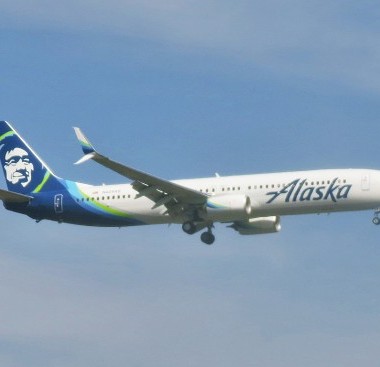Boeing’s Max 9 crisis upends Hong Kong airline startup’s growth
Hong Kong startup carrier Greater Bay Airlines Co.’s plans to challenge the dominance of Cathay Pacific Airways Ltd. have been thrown into disarray, with delivery of an order of Boeing Co. Max 9 jets likely to be delayed after the mid-flight panel blowout on an Alaska Airlines flight.
Greater Bay is midway through a yearlong process to prove to Hong Kong’s Civil Aviation Department that the Max 9 jet is airworthy. However, after the Jan. 5 near-disaster when a door plug panel blew out not long after takeoff, the US Federal Aviation Administration has grounded most Max 9 jets, a measure it intends to keep in place until extensive inspections are complete.
“What has happened isn’t helping the process,” Greater Bay’s Chief Executive Officer Stanley Hui said in an interview. Work on Hong Kong’s certification process “has to be deferred, maybe it will take a longer time for that to be completed,” he said.
Greater Bay will be the first local airline to operate any of the trouble-plagued Max family of planes.

Hong Kong’s CAD said it would monitor the Alaska Air probe “and may consider imposing additional requirements when more relevant information becomes available” from the investigation and Boeing. Boeing declined to comment.
Greater Bay announced the original deal for the Max 9s, along with a commitment to five 787s, with great fanfare in March 2023, with Boeing executives including Commercial Airlines CEO Stan Deal flying to Hong Kong for the event.
The 15 Max 9 jets are essential to Greater Bay’s expansion plans, and its effort to compete effectively with Cathay in flying from Hong Kong to regional Asian cities, some of the busiest international routes in the world.
Greater Bay says it was already facing a two-month delay to the first two deliveries, which were initially slated for August this year. Hui said Boeing informed the carrier in November that those first deliveries will now occur this October.
The carrier’s Max 9 jets won’t have the door plug that blew out on the Alaska Air flight because its need to pack in as many seats as possible necessitate the requirement for extra emergency exits.
“What happened is obviously quite a blow,” said Hui, a veteran aviation executive who previously ran now-defunct carrier Dragonair, also headed the Airport Authority Hong Kong, and was a director of Air China Ltd. “We’re lucky there were no casualties, but it was a very scary event.”
“Rest assured that after this accident, Hong Kong’s CAD will be even more careful in scrutinizing” the planes, he added.
Similar Stories

Chapman Freeborn agrees partnership with Portuguese multimodal logistics specialist
View Article
Cathay is ready for the commissioning of the three-runway system at Hong Kong International Airport
View ArticleUnited Airlines Holdings Inc. upgraded To ‘BB’; outlook stable
• United Airlines Holdings Inc. is on track to generate credit measures in line with our previous upside rating threshold this year, and we expect improvement in 2025. • The…
View Article
WorldACD Weekly Air Cargo Trends (week 46) - 2024
View Article
Freightos and E2open integrate to simplify air cargo bookings
View Article
Citywide sale-leaseback highlights Phoenix Airport submarket
View ArticleGet the most up-to-date trending news!
SubscribeIndustry updates and weekly newsletter direct to your inbox!





